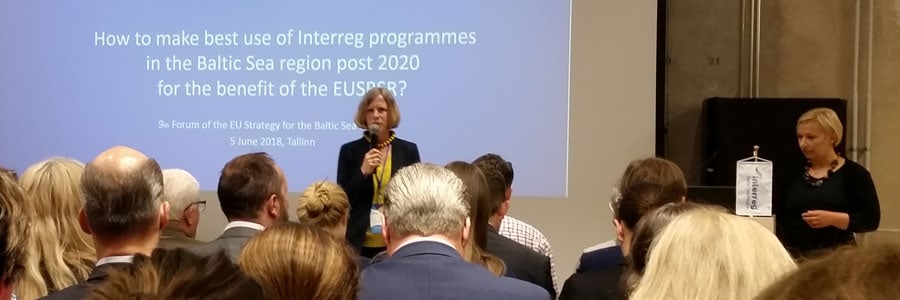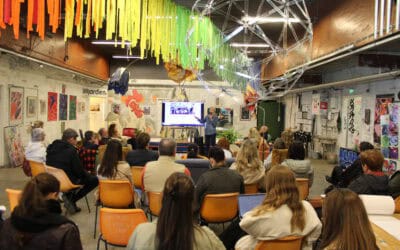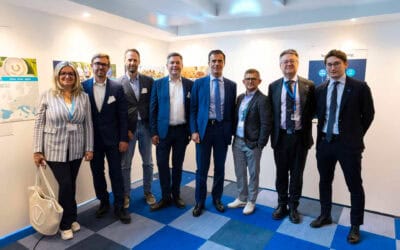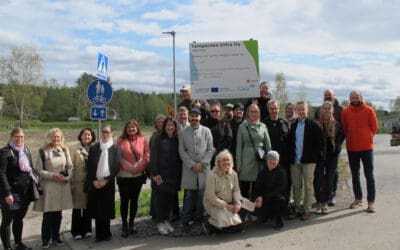Interreg Baltic Sea Region launched the debate with its stakeholders about funding after 2020. More than 100 participants of the 9th Annual Forum of the EU Strategy for the Baltic Sea Region (EUSBSR) joined a seminar about how to distribute Interreg funds for 2021-2027 for the benefit of the EUSBSR. The workshop mapped out the most pressing needs of different stakeholders as a basis for future programme development.

Mapping out stakeholders’ needs for Interreg funding after2020 at a seminar in Tallinn, © IB.SH/Maack
“All of our stakeholders presented very pragmatic proposals for distributing future Programme funds for the benefit of the EUSBSR and gave us valuable input for further discussion”, says Susanne Scherrer, Director of the Managing Authority/Joint Secretariat of Interreg Baltic Sea Region. Four panellists, namely a member of the Programme’s Monitoring Committee, an EUSBSR National Coordinator, a Horizontal Action Leader and a flagship leader presented their proposals on “how to cut the cake” after 2020 for the benefit of the EUSBSR.
Background
Interreg programmes, both transnational and cross-border, have funded European territorial cooperation in the Baltic Sea region for two decades. Over the past years, Interreg Baltic Sea Region has been the main financial source to implement activities of the EUSBSR. It has been financing flagship projects (about EUR 115 million ERDF in the current programming period), provided seed money for project development (EUR 3 million ERDF) and supported the governance structure of the Strategy (EUR 10.8 million ERDF). The remaining funds go to other transnational cooperation projects including project cooperation platforms (EUR 135 million ERDF) and the fund management (up to EUR 17 million ERDF).
Support to EUSBSR governance is needed also in the future
The panellists agreed that there is a need for financial support to the work of the PACs/HACs. “Support to PACs/HACs has been useful as it allows them to join forces and implement activities together” stated Monika Stankiewicz of HELCOM who is one of the coordinators of Horizontal Action Spatial Planning. Joanna Przedrzymirska from Maritime Institute of Gdansk, representing the point of view of project implementers, asked for more support to capacity building for people on the ground to take responsibility.
There is a need for smaller and larger Interreg projects
When it comes to funding for projects, there were different views about the necessity to differentiate between flagships and none-flagships. Jens Kurnol (German Federal Institute for Federal Institute for Research on Building, Urban Affairs and Spatial Development) who is a member of the Programme Monitoring Committee, and other panellists expressed the need for more flexibility in terms of duration and size of cooperation projects. “Why not consider projects as short as one year or as long as five, and applying for only EUR 50.000 or up to EUR 5 million”, Jens Kurnol asked. Pointing out to the limitations of funding through projects, Erja Tikka, EUSBSR National Coordinator of Finland, raised another point: “How to fund processes within the Strategy which take longer than a single project?” All panellists saw the need to continue maritime cross-border cooperation in the region as this serves specific needs of parts of the region.
More discussions about future funding coming up
These issues need to be addressed in future discussions – about Interreg and about the EUSBSR after 2020. As a first step, the issues were presented to all members of the Programme Monitoring Committee and EUSBSR National Coordinators back to back with the Forum. The Programme bodies are determined to find practical solutions assuming the Strategy will further develop in terms of focus, smart objectives, a monitoring system and a clear vision for improving the life for the citizens of our Baltic Sea Region.






